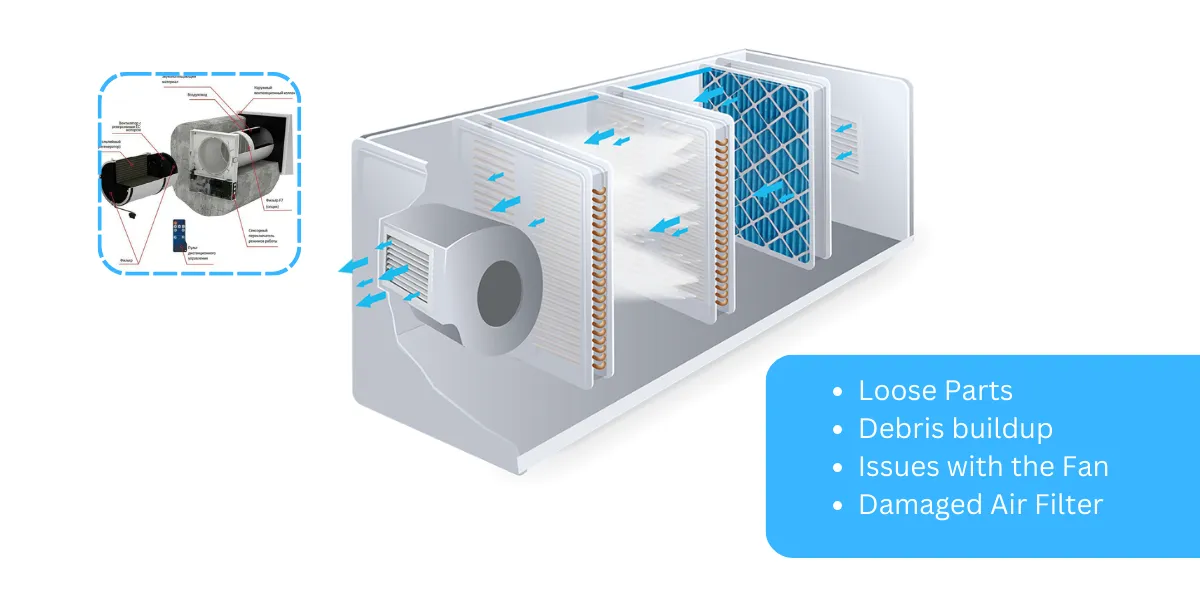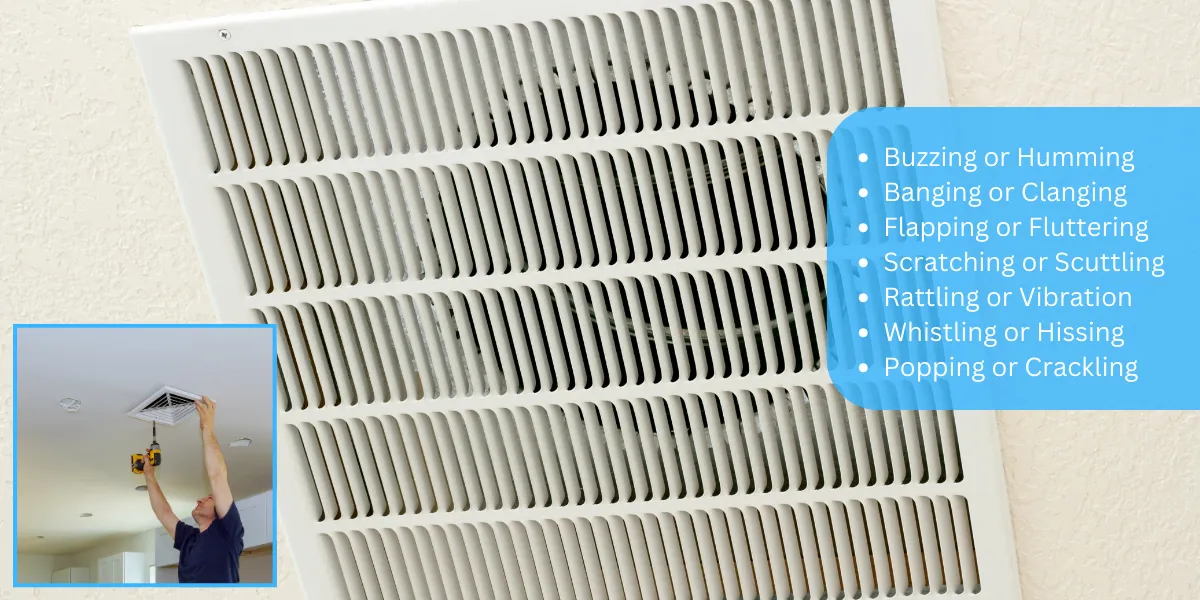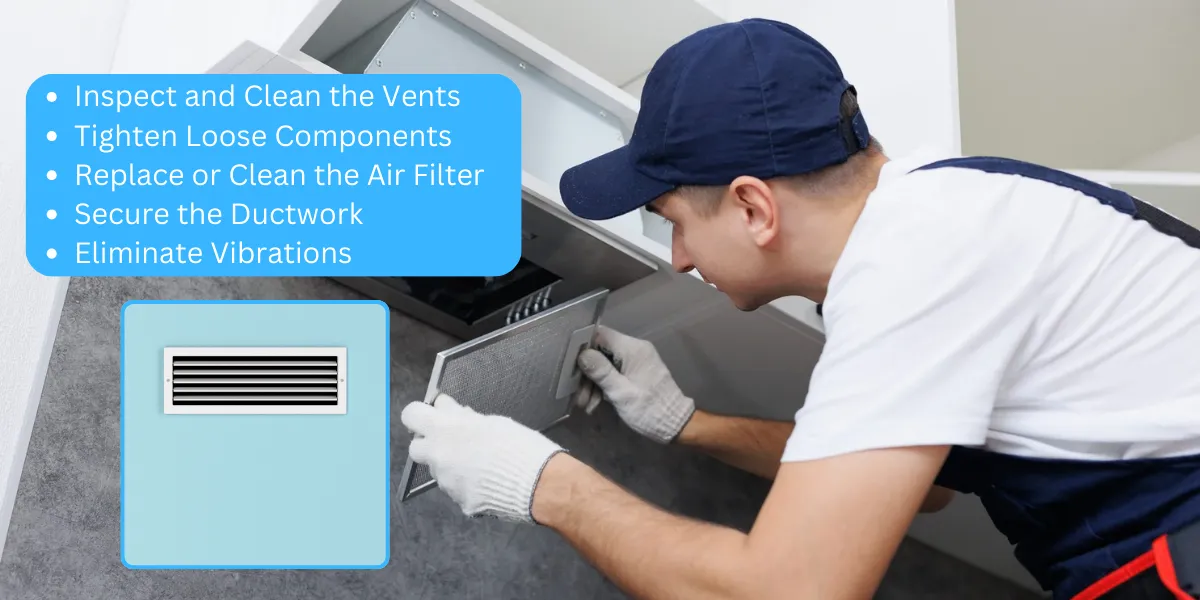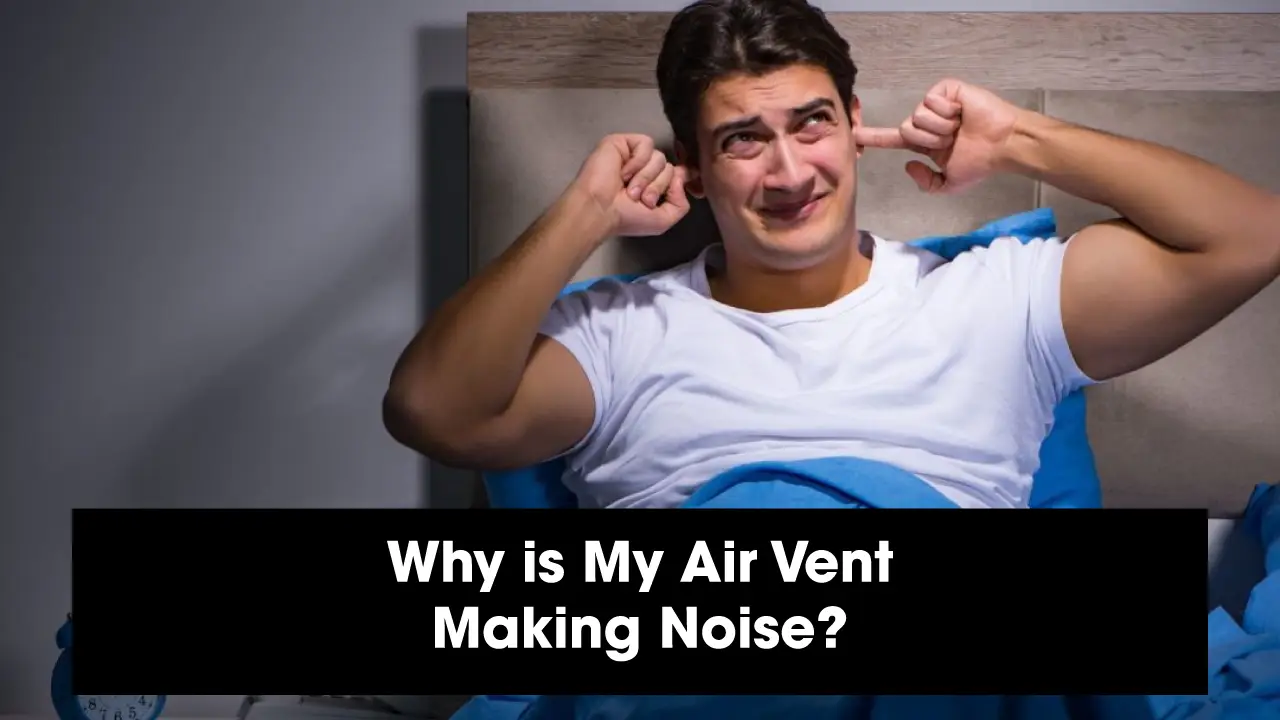
Why is my air vent making noise? – it’s a common concern for homeowners and can be quite frustrating. Your HVAC system is supposed to keep your home comfortable and quiet, but it can be frustrating when you hear strange noises from your air vents.
So, if you’ve been bothered by the sounds emanating from your air vents, don’t worry! In this blog, we will explore the reasons behind noisy air vents and provide practical solutions to address them.
Common Causes of Noisy Air Vents
When it comes to the irritating sounds coming from your air vents, understanding the root causes is the first step towards finding a solution.
Here are some of the most common reasons why your air vent might be making noise–

Loose Parts
Over time, components within your HVAC system, such as screws, bolts, or duct connections, can become loose. When air flows through the vents, these loose parts may vibrate, resulting in buzzing or rattling noises.
Debris buildup
The dust, dirt, or debris accumulation within the ductwork can also lead to whistling or flapping noise as air passes through. These particles can obstruct or cause vibrations, rattling, or buzzing sounds.
Issues with the Fan
Problems with the fan, such as worn-out bearings or imbalanced blades, can produce loud noises when the HVAC system is in operation. This may manifest as a persistent humming or whirring sound.
Damaged Air Filter
A clogged or damaged air duct filter can restrict airflow, causing the HVAC system to work harder and produce excessive noise. Regularly cleaning the air filter can help prevent this issue.
Improper Duct Design or Installation
Poorly designed or improperly installed ductwork can cause airflow restrictions, turbulence, or uneven distribution of air, leading to banging or flapping noises as air passes through.
Vibration from HVAC Equipment
Vibrations from the HVAC equipment, such as the furnace or air handler, can transmit through the ductwork and produce rattling or vibrating noises. Securing or isolating the equipment can help mitigate this issue.
Leaky Ducts
Leaks in the air ductwork can allow air to escape, causing whistling or hissing noises. Sealing the leaks with duct tape or mastic can help reduce noise and improve energy efficiency.
Animal Intrusions
Small animals or insects may find their way into the ductwork, creating scratching or rustling noises as they move around. Inspecting and sealing any entry points can prevent further intrusions.
Worn-Out Components
Over time, various HVAC system components, such as belts, motors, or bearings, may wear out and require replacement. Noises associated with worn-out components can range from squealing to grinding, indicating the need for maintenance or repair.
Inadequate Insulation
Poor insulation around the ductwork can allow heat or cold to penetrate the vents, leading to condensation buildup. The dripping or dripping sounds caused by condensation can mimic other noises, making it essential to check for insulation issues.
Specific Noises and Their Causes
Understanding the specific noises from your air vents can provide valuable clues about the underlying issues. Here are some common types of noises and their potential causes –

Buzzing or Humming
A buzzing or humming noise often indicates loose parts, such as screws, bolts, or duct connections, vibrating against each other. A malfunctioning fan motor or electrical component can also produce this type of noise.
Banging or Clanging
Banging or rattling noises typically result from loose or damaged components within the HVAC system, such as fan blades, bearings, or motor mounts. Thermal expansion or sudden changes in airflow direction can also cause metal ducts to expand or contract, resulting in banging sounds.
Flapping or Fluttering
Flapping or fluttering noises are commonly caused by debris or obstructions within the ductwork, such as leaves, paper, or plastic bags. These objects may move around as air flows through the vents, creating fluttering sounds.
Scratching or Scuttling
If you hear scratching or scuttling noises from your air vents, small animals, insects, or rodents may have made their way into the ductwork. They may be nesting, foraging for food, or attempting to escape, causing these distinctive sounds.
Rattling or Vibration
Rattling or vibration noises can result from various sources, including loose ductwork, unsecured components, or nearby objects transmitting vibrations through the walls or floors. Poorly insulated ducts can also amplify these noises.
Whistling or Hissing
Whistling or hissing noises often indicate airflow restrictions or leaks within the ductwork. Common culprits include closed or blocked vents, improperly sized ducts, or gaps and cracks in the ducts or connections.
Popping or Crackling
Popping or crackling noises are typically associated with thermal expansion and contraction of the ductwork as it heats up and cools down during HVAC system operation. This phenomenon is more common in metal ducts and is considered normal.
How do you fix a noisy air vent?
Dealing with a noisy air vent can be frustrating, but fortunately, there are several ways you can take to address the issue. Let’s have a look–

Inspect and Clean the Vents
Start by visually inspecting the vents for visible obstructions, such as dust, debris, or foreign objects. Use a vacuum cleaner with a brush to remove buildup inside and around the vent covers.
Tighten Loose Components
Check for loose screws, bolts, or duct connections within the HVAC system. Use a screwdriver or wrench to tighten loose fasteners and ensure all components are securely in place.
Replace or Clean the Air Filter
A dirty or clogged air filter can restrict airflow and cause noisy operation. Check the air filter and replace it if it’s dirty or clogged with dust and debris. Regularly cleaning or replacing the air filter can help prevent future noise issues.
Secure the Ductwork
Inspect the ductwork for any loose or unsecured sections, especially at connection points or where ducts pass through walls or floors. Use duct tape or metal straps to secure any loose ductwork and minimize vibrations.
Eliminate Vibrations
Vibrations from nearby appliances or machinery can transmit through the walls or floors and cause rattling or buzzing noises in the vents. Identify and address the source of the vibrations to minimize noise pollution.
When to Call a Professional
While DIY solutions can resolve many noise issues with air vents, there are times when it’s best to call a professional HVAC technician. Consider seeking professional assistance in the following situations–

Complex Issues
If you cannot identify the noise source or the problem persists despite your efforts, it may indicate a more complex issue requiring professional expertise to diagnose and repair.
Electrical Problems
If mishandled, buzzing or humming noises from electrical components, such as the motor or transformer, can pose safety hazards. A qualified technician can safely inspect and address electrical issues to prevent accidents.
System Malfunctions
Suppose other HVAC system malfunctions, such as inconsistent heating or cooling, frequent cycling, or unusual odors accompany the noise. In that case, it may indicate underlying mechanical or electrical problems that require professional attention.
Preventive Maintenance
Regular maintenance checks by a professional HVAC technician can help prevent noisy air vents and extend the lifespan of your system. Schedule annual inspections and tune-ups to keep your HVAC system running smoothly and quietly.
Conclusion
Noisy air ducts disrupting your peace? Don’t worry, Stream Express Air Duct Professionals are ready to assist. Whether it’s due to loose components, debris accumulation, or other issues, our expert team is adept at diagnosing and resolving the problem.
Still pondering, ‘Why is my air vent making noise?’ Reach out to Stream Express today for a professional assessment and enjoy a breath of fresh, quiet air once again!
FAQs
Why do I hear noise in my vent?
Hearing noise in your vent could be due to various reasons, such as loose parts, debris buildup, or thermal expansion. It’s essential to identify the specific cause to address the issue effectively.
Is it normal for vents to make noise?
While some minimal noise is normal, excessively loud or persistent noises indicate underlying problems that should be addressed. Regular maintenance can help prevent noisy vents.
How do I stop my air vent from rattling?
To stop your air vent from rattling, try tightening loose screws, securing ductwork, or adding insulation. If the issue persists, consider seeking professional assistance to diagnose and fix the problem.


